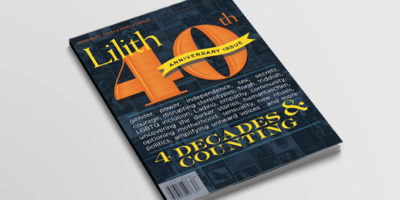
Fall 2016: I Hate the Label “Jew by Choice”
 “You aren’t really a convert, though.”
“You aren’t really a convert, though.”
I can’t tell you how many times I hear these words. Usually from friends trying to exclude me from whatever comment they’re about to make about converts. Instead of making me uncomfortable, though, these moments remind me of the varied ways there are to be Jewish.
My Jewish journey isn’t typical, but whose is? My dad began his conversion to Judaism when I was 13, and my mom (who didn’t have a Jewish family background) followed shortly after, saying she discovered late in life that she’d always been Jewish. Dad was of Jewish descent on his father’s side; my grandfather had been born Jewish, but began practicing Christianity as a boy, and Dad always said that becoming Jewish felt like coming home.
I spent my adolescent years rebelling against Judaism. Mom wanted me to come downstairs on Friday nights for our new family tradition: my parents saying Shabbat prayers while I pointedly remained silent. For me, religion seemed a disingenuous way to make the world easier.
When I started college, Dad persuaded me to go to Hillel—for the free food, he said. “Do you really think I’d sell out my principles for free food?” I asked when he first suggested the idea. “Your prin- ciples are free food,” he countered.
Feeling that he had a point, I went.
Hillel became my home on campus and kept my head from sinking too far beneath the water as I struggled through that first year. I attended services weekly and slowly came back to a better mental space. Despite my best efforts and my insistence that I wasn’t Jewish, I began thinking of myself as Jewish anyway. I’d spent a lot of time in high school defining myself as not-Jewish in opposition to my parents’ practice, and so this about-face was very much not what I expected from my first year of college. Nevertheless, the thoughts kept coming, and soon I learned to embrace a Judaism that was simultaneously distinctly my own and inextricably bound to my family.
Two years later, I emerged from the mikveh. In retrospect, I view my experience of conversion as a meaningful ritual that marked a transformation in a Judaism I already felt. I never had a bat mitzvah, but I did have a conversion. This is why I’m comfortable calling myself a convert—it’s a noun that describes my participation in this ceremony. Still, I don’t think it was the conversion process that made me a Jew. Without my noticing, I had become Jewish long before.
Did I choose Judaism? Perhaps. I chose to go to Hillel, I chose to be examined before a beit din (a panel of rabbis), and I chose to submerge myself in a mikveh. Yet, I chose neither my family history nor my now-Jewish parents. My history and my family cannot be chosen or unchosen. Before I officially converted, I remembered wishing to myself that I wasn’t Jewish. I then realized that—according to religious law at least—I wasn’t. I thought about what it would mean not to be Jewish, and understood that for me this wasn’t an option. Paradoxically, the moment I no longer wanted to be Jewish was the moment I knew I was a Jew.
Because of all this, I hate the term “Jew by choice.”
The phrase creates a false binary between those who choose to be Jewish and those born with Judaism. Not only does it assume that those who converted had a completely autonomous individual choice to opt-in to Judaism, but it also implies that those who were born Jewish have no agency in their Jewish identity. This sits poorly with me. I have multiple relatives who would halakhically be considered Jewish, but are not viewed as such by themselves, or by the outside world.
What, then, does being Jewish mean? Judaism is not only a religion; Judaism houses avowed atheists. It is not only a set of political beliefs; Judaism houses those with directly contradictory political positions. It is not only a culture; Judaism houses many cultures, as well as converts without a culturally Jewish background.
I’ve come to see Judaism as a relationship with, rather than adherence to, a given sets of texts, religious practices, histories, cultures, and/or political views. We can be Jewish by refusing to cross a picket line (as one civil rights veteran describes her inherited Judaism), by eating latkes, by keeping kosher, or by gleefully breaking kashrut.
The phrase “Jew by choice” is meant to be affirmational, but in- stead erases the ambiguities of my experiences and the experiences of so many others. Individual choice plays a role in Judaism, as do societal factors outside of anyone’s control. This is true regardless of whether one had a B’rit Habat, the naming ceremony for a new-born daughter, or was examined by a beit din in her twenties. How can I do anything but reject a term that dichotomizes what should instead be an untidy but richly variegated spectrum?


